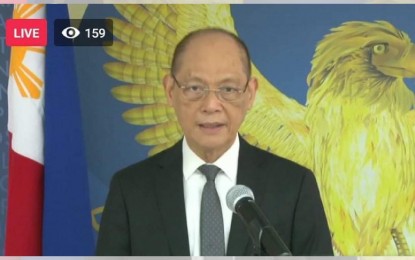
BSP Governor Benjamin Diokno (file photo)
MANILA – The Bangko Sentral ng Pilipinas (BSP) has imposed ceilings on interest rates, fees, and penalties for late payments or non-payments for general purpose loans not higher than PHP10,000.
In a virtual briefing on Thursday, BSP Governor Benjamin Diokno said the central bank’s policy-making Monetary Board (MB) has set a nominal interest rate ceiling of 6 percent per month, an effective interest rate of maximum of 15 percent per month, and a 5 percent per month penalty for late payment or non-payment.
He said the circular for these rates has yet to be published while the implementing rules and regulations will be issued by the Securities and Exchange Commission (SEC) through a memorandum circular.
Diokno said recommendations for the loan ceilings, rates, and penalties for loans that have a maximum tenor of four months were discussed with the SEC since the latter is the regulator of lending companies (LCs), financing companies (FCs), and other online lending platforms (OLPs), and were made in consultation with market players.
These latest regulations were adopted after the SEC cited a surge in borrowing rates for payday and personal loans in recent years, he said.
Diokno disclosed that the nominal interest rate, which pertains to a certain percentage of the borrowed amount, extended by LCs jumped by about 60 percent annually from 2014-2015 to about 360 percent per annum from 2016-2019, and as much as 504 percent per annum in 2020.
As a result, the SEC has received numerous complaints, totaling about 4,363 letters, from January 2020 to May this year, he said.
These complaints, Diokno said, “prompted the SEC to seek the BSP’s help in prescribing interest rate ceilings on financing and lending companies.”
“The imposition of the interest rate ceilings is also in consideration of the hardships brought about by the Covid-19 (coronavirus disease 2019) pandemic,” he said.
Diokno said regulators want to strike a balance between consumer protection against predatory lending while ensuring small borrowers’ access to credit.
“For borrowers, the caps should be low enough to protect them from predatory lending. For lenders, the caps should (be) at a level that accommodates credit risks and provide an enabling environment where their lending business will continue to be viable,” he said.
He added these rates are higher than those imposed by credit cooperatives and non-stock savings and loan associations for similar unsecured loans and the interest rate charged by pawnshops for secured loans. (PNA)
